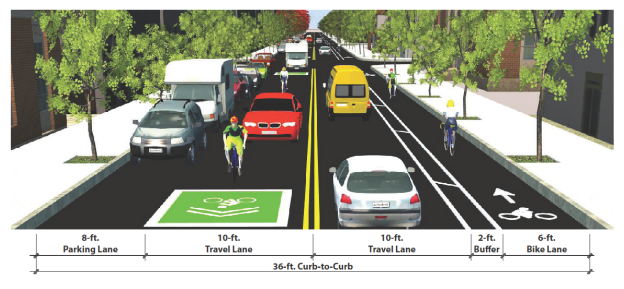
to discuss the 28th Avenue commercial district of
the planned 20s Bikeway.
(Photos by M.Andersen/BikePortland)
For the most vocal business owners along 28th Avenue’s commercial strip, the mystery seems to be: why can’t people on bikes just take 30th instead?
At the city’s first meeting with businesses on the subject Wednesday, Portland Bicycle Coordinator Roger Geller made a data-rich argument that business owners don’t want to push bikes two blocks away from their storefronts.
Instead, he argued, the city’s lead proposal for the street would give them a chance to be “the most bike-friendly business district in the most bike-friendly city in America” while increasing the flow of people past their storefronts as more Portlanders shift from cars to bicycles for commercial errands.
“If 28th were any other district, we wouldn’t even be here,” Geller said. “We’re talking about 28th because people want to get to 28th.”
Improving biking on the street, he said, would be the way to increase the flow of customers to those businesses without as much need for new parking space, which is free in the neighborhood to residents and visitors alike — and increasingly scarce.
The tradeoff, he said: biking on the street can’t be improved without removing some of the auto parking and delivery spaces, something many of the business owners feel is essential to their operations.

“I’m afraid,” said Scott Mapes, owner of La Buca Cafe. “I’m just eking by, trying to pay my employees, pay myself.”
Bill Crane, owner of Holmans Bar and Grill, seemed particularly upset. He said he feels the city wants to perform an experiment on the district that he and his business would suffer from if it goes awry.
“Your paycheck still comes, and mine goes away,” he told Geller.
The meeting wasn’t a pillorying, and though many who were there seemed skeptical that increasing bike traffic would substitute for the lost car parking, some also said they personally supported biking and appreciate customers on bikes. John Taboada of Navarre Restaurant said he’d lived in Portland for 20 years without even owning a car. Alison Weaver, owner of Meadowlark Preschool, noted that she still doesn’t.
But Weaver said she’s unusual: at a house beside hers, two residents share three cars. Parents who patronize her preschool often drop off their children by bicycle in the summer, she said, but they drive there in the winter.
“I’m so supportive in so many ways of what you’re talking about,” another business owner told Geller, before adding that her business was too small to take big risks. It seemed to be a common sentiment.
Geller floated the idea that the city could make the changes temporary.
“We could try it for just 18 months,” he said. “If it doesn’t work, we could go back. It’s not that big of a deal.”
One person in the audience replied that businesses wouldn’t last 18 months if things go badly.
Several attendees of the meeting said 30th Avenue — which the city plans to improve into a neighborhood greenway no matter what — would be a better place to ride a bicycle in any case.
Geller replied that this was true “if you just care about people moving.” But, he said, bikers want to reach businesses on the commercial strip — and store owners “want people riding slowly past your business with the ability to stop.”

Also representing the city at the meeting were project manager Rich Newlands and his boss, capital program manager Dan Layden. Both struck a noticeably different tone than Geller. Layden said several times that the city’s proposal was only one option and that improving only 30th Avenue was also on the table.
“We want this to be a partnership,” Newlands told business owners as the meeting wrapped up. “We are just saying this is an idea. We are not saying, ‘This is what we want to do, and we’re trying to sell you on it.'”
Update 5:50 pm: At the end of the meeting, Geller asked attendees to fill out slips of paper indicating their support for the city’s proposal. He characterized “yes” as being in favor of the city’s proposal, “maybe” as wanting more information and “no” as “no way, no how, I’m done.” The results, Newlands writes in an email, were 10 “nos,” 5 “maybes” and two “yeses.”
More info on the 20s Bikeway Project:
– Past coverage on BikePortland
– PBOT’s official project page


